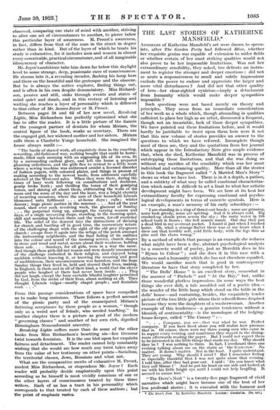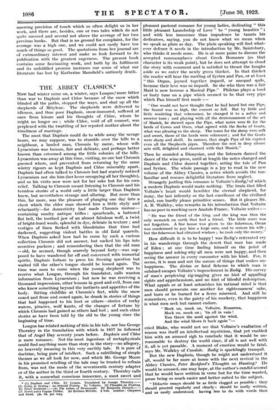THE LAST STORIES OF KATHERINE MANSFIELD.*
ADMIRERS of Katherine Mansfield's art were drawn to specu- late, after The Garden Party had followed Bliss, whether
her exquisite genius was capable of extension to wider fields or whether certain of her most striking qualities would not
also prove to be her impassable limitations. Was not her extraordinary sensibility, they asked, too delicate an instru- ment to register the stronger and deeper emotions : did not
so acute a responsiveness to small and subtle impressions exclude the power to endure and appreciate the larger and
more vital disturbances ? And did not that other quality of hers—her clear-sighted cynicism—imply a detachment
from bumanity which would make deeper sympathies impossible ?
Such questions were not based merely on theory and principles. They arose from an immediate consideration of her work as a whole which, though abound in„ in qualities
sufficient to place her high as an artist, discovered a frequent, though not an invariable, lack of those deeper sympathies.
We have pointed out these limitations before, and it would hardly be justifiable to insist upon them here were it not that this new volume of stories provides an answer to the questions to which we have referred. Incomplete though most of them arc, they and the quotations from her journal which appear in the Introductory Note give ample evidence that, when she died, Katherine Mansfield was in process of outstepping those limitations, and that she was doing so without any sacrifice of the sensibility which was her most individual and entrancing quality. More than all the stories in this book the fragment called " A Married Man's Story " shows us what we have lost. There is in it a depth, a pathos, and a subtlety of what may be called emotional characteriza- tion which make it difficult to set a limit to what her artistic development might have been. We see here at its best her extraordinary faculty for expressing emotional and psycho- logical developments in terms of concrete symbols. Here is an example, a man's memory of his early schooldays :—
" I am standing in a ring of thrust-out heads ; some are grinning, some look greedy, some are spitting. And it is always cold. Big crushed-up clouds press across the sky ; the rusty water in thb school tank is frozen ; the bell sounds numb. One day theY put a dead bird in my overcoat pocket. I found it just when I reached home. Oh, what a strange Rutter there was at my heart when I drew out that terribly soft, cold little body, with the legs thin as pins and the claws wrung."
By a method of which that passage is an example she reduces what might have been a dry, abstract psychological analysis to a concrete world of poetry, just as Meredith does in his
" Hymn to Colour " ; and she does it in this case with a richness and a humanity which she has not elsewhere equalled. We would sacrifice much that is good in contemporary literature to have that story completed by her.
" The Dolls' House " is an excellent story, somewhat in the manner of " Prelude " and " At the Bay," but, unlike those wonderful plotless impressions (in some ways the best
things she ever did), a tale moulded out of a poetic idea—
the wonder of the little lamp which stood on the table in the dolls' house—and containing, besides, the exquisitely tender picture of the two little girls whom their schoolfellows despised because they were the daughters of a washerwoman. Another example of this tenderness—a genuine tenderness without a blemish of sentimentality—is the monologue of the lodging- house-keeper, called " The Canary "
". • . Company, you see—that was what he was. Perfect company. If you have lived alone you will realize how precious that is. Of course, there were my three young men who came in to supper every evening, and sometimes they stayed in the dining- room afterwards reading the paper. But I could not expect them to be interested in the little things that made my day. Why should they be ? I was nothing to them. In fact, I overheard them one evening talking about me on the stairs as the Szarecrow.' No matter. It doesn't matter. Not in the least. I quite understand. They are young. Why should I mind t But I remember feeling so especially thankful that I was not quite alone that evening. I told him, after they had gone out. I mid : Do you know what they call Missus ' And he put his head on one side and looked at me with his little bright eye until I could not help laughing. It seemed to amuse him."
" The Dove's Nest " is a twenty-five page fragment of vivid' narrative which might have become one of the best of her less profound stories ; it is executed with the humour and • The Dove's Nest. By Katherine Mansfield. London: Constable, la, nati
unerring precision of touch which so often delight us in her work, and there are, besides, one or two tales which do not quite succeed and several not above the average of her two previous books. But that is no ground for complaint, for the average was a high one, and we could not easily have too much of things so good. The quotations from her journal are of extraordinary interest and make us look forward to its publication with the greatest eagerness. The present book contains some fascinating work, and both by its fulfilment and its unfulfilled promise increases our sense of what our literature has lost by Katherine Mansfield's untimely death.











































 Previous page
Previous page